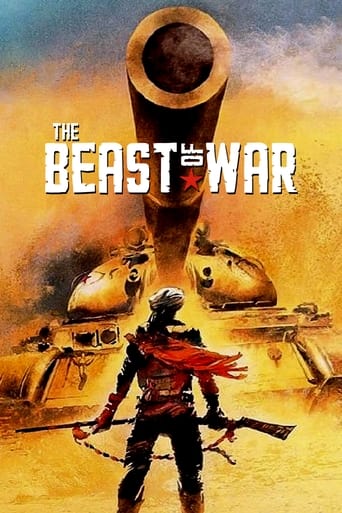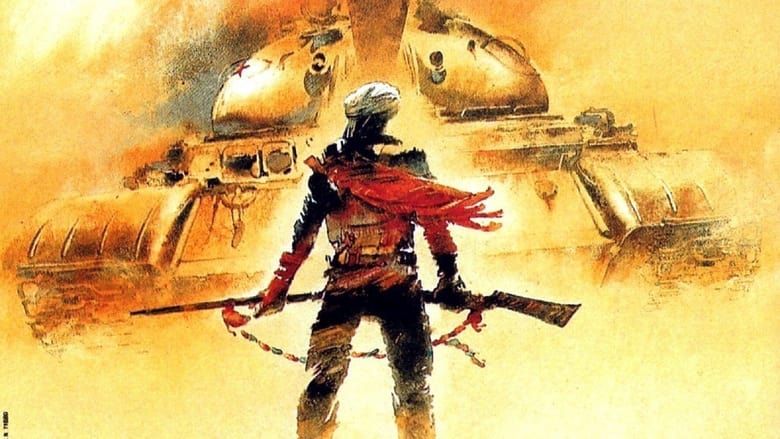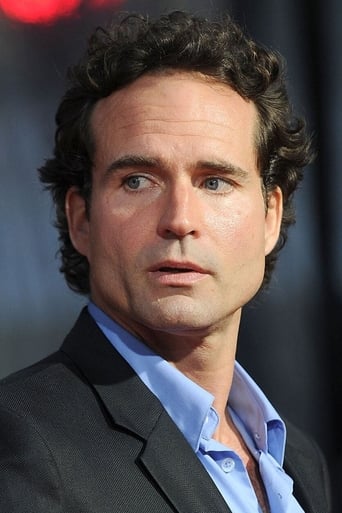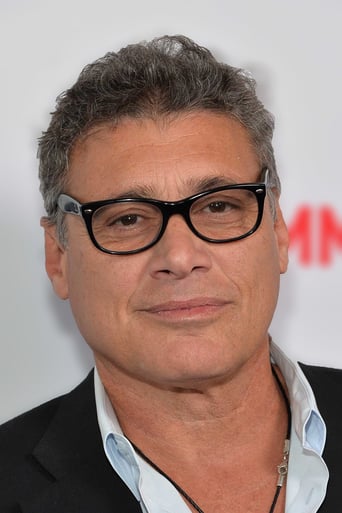The Beast of War (1988)
During the war in Afghanistan a Soviet tank crew commanded by a tyrannical officer find themselves lost and in a struggle against a band of Mujahadeen guerrillas in the mountains.
Watch Trailer
Free Trial Channels
Cast


Reviews
Waste of time
It's not great by any means, but it's a pretty good movie that didn't leave me filled with regret for investing time in it.
The acting is good, and the firecracker script has some excellent ideas.
One of the most extraordinary films you will see this year. Take that as you want.
If you have recently watched the 2014 movie "Fury" I would strongly suggest "The Beast" as another and I would say superior film about claustrophobic, brutal warfare centered on one tank crew left to fend for themselves in hostile territory, much like in Fury. I don't think it will spoil it to mention a few things to make it appealing to check out. The cast is outstanding and perfectly chosen. I liked this movie far better than Fury which has too many Hollywood restrictions on it to be credible, especially the more Fury unfolds, the more BS they incorporate."The Beast" takes place during the decline of Soviet power in Afghanistan and the military is bugging out but this crew is still on patrol and has their commands to follow. What you end up doing early on is choosing who are the good guys in this movie. It's up to you as the story unfolds. The tension of being in a tank crew and the operation of the tank are very detailed in the mechanics and the interaction of the men. I won't say realistic because I don't have first hand knowledge of that.I have no interest in watching Fury a second time but I have watched The Beast numerous times. Too bad it didn't get more attention when it came out originally.
an underrated gem.deserves at least an 8 on IMDb.greatest achievement of the film is to allow us to empathize with the afghans as well as the Russian soldiers ,although we know that Russia has the negative image here.also we get to understand the pathetic condition of the Afghanistan.apart from these achievements as a movie also the film entertains and thrills you to the core with its awesome climax.definitely in my top 10 war movies of all time along with Tae gukji, My way,spr, Platoon, Full metal jacket, Deer hunter, Cross of iron, Letters from iwo jima and The thin red line .definitely a 10 out of 10 for me.
The bad thing about owning a tank is all your friends want to borrow it when they invade a country.However, the invading vehicle in this action movie is on loan from the Soviets.During their invasion of Afghanistan, a Soviet tank - lead by Commander Daskal (George Dzundza) - loses its bearings following a raid on an Islamic radical village.When pacifist Taj (Steven Bauer) finds his father murdered by the communists, he's forced by the village to retaliate.In pursuit, he encounters a tank crewman (Jason Patric) jettison by his crewmates (Stephen Baldwin, Don Harvey) for mutiny.In exchange for sanctuary, the crewman must repair Taj's anti-tank gun.Despite little attempt at masking their American accents, the manly cast of this underrated and action-packed adaptation of the stage play manages to convey the message of mercy during wartime.Incidentally, isn't the national symbol of Russia an invading tank?Green Lightvidiotreviews.blogspot.ca
"Systems exist so we never meet each other." - Mr. Lif This is a review of "Rambo 3", "The Living Daylights" and "The Beast", three action movies from the late 1980s, now interesting for the way in which they toe the Pentagon line regarding Afghanistan's Mujahideen.The best of the three films, "Rambo 3" stars Sylvester Stallone as a Vietnam veteran who lives in a monastery, looks depressed, pumps iron and wears a mullet. Though now a pacifist, Rambo nevertheless returns for "one last job". His old Colonel has been kidnapped by evil Soviets forces and is being imprisoned in a super cool looking military base deep within the heart of Afghanistan. Rambo's mission? Get in, kick ass, get out. As he's essentially a giant walking penis, Rambo severely overcompensates. Not only does he rescue his buddy, but he kicks Russia out of Afghanistan, rallies a band of friendly Mujahideen freedom fighters, teaches locals to love Westerners and schools us all in the evils of communism. The film ends with a title card praising the brave heroes of the Mujahideen."The Living Daylights" tells the same tale, though here our hero is British Secret Agent James Bond (Timothy Dalton). Less homo-erotic than Stallone's film, but equally patriotic, "Daylights" opens with various totems of Britannia - the Rock of Gibraltar, Union Jacks, Harrier jets - before nosediving into a plot about defecting Russians, Afghan opium and evil commies. Once again the film ends with Mujahideen on horseback charging valiantly toward Soviet Forces. The Empires of the West – and their lovable henchmen, Bond and Rambo - love underdog freedom fighters, see.Less cartoonish but more fascist, "The Beast" revolves around a Soviet tank crew. They rape and pillage Afghan villages, blow up mosques, their racist, tyrannical leader is shown to hate even pro-communist Afghan allies, and our hero is an enlightened Russian who defects and joins forces with the Mujahideen to once again, like Rambo, charge headlong into Soviet tanks and helicopters.In all these films, the Mujahideen are portrayed as civilised, well educated freedom fighters pitted against remorseless, uncouth Soviet monsters. What's hilarious is that as soon as the Soviet Union collapses, cinema immediately starts portraying the Mujahideen as villains; they're now of no use. They're US public enemy number 1.In 1893 Russia recognised British "ownership" of Afghanistan. When Britain exited India and its Empire collapsed, Russia moved tentatively in. A communist party was set up and the country's old kings and monarchs kicked out. Major reforms then began taking place - modernisation, a secular government, women's rights, large scale land reforms, public education etc – which were all initially accepted. Some thought communism wouldn't work in a country as conservative and traditional as Afghanistan, but of course Soviet styled communism turned out to be but a form of industrial feudalism with elements of Russian nationalistic tribalism. Afghans supported these changes. Problems quickly began occurring, though. Afghanistan's filled with diverse tribal groups, and cracks began to appear, both inside the communist party – different factions vying for control – and outside, religious and tribal leaders opposing the rapid social changes. As extreme reforms were being carried out in VERY short periods of time with NO concern for Afghan culture, small protests began. Islamist rebels who wanted to restore an older, more traditional Islamic order, were the most vocal. Aided, armed, funded and led by the West, they staged bloody clashes with the pro communist government. This went on for a number of months. Eventually Western backing for these rebels escalated to such an extent that the local government was forced to call for Russian support. Soviet troops arrive, which the West spins as an "invasion". Cue Western propaganda: here was an evil Soviet invasion being held back by lovable rebels. The truth was almost the complete opposite. Afghanistan was a Soviet ally dealing with CIA-backed Islamist radicals trying to topple the capital of Kabul. Later, US defence secretary Robert Gates would say: "We mean to suck the Soviets into a Vietnamese-styled quagmire." And Zbigniew Brzezinski: "We knowingly increased the probability of their intervention with the aim of drawing the Soviets into the Afghan trap. The day that the Soviets officially crossed the border, I wrote to President Carter, 'We now have the opportunity of giving to the Soviet Union its Vietnam War.'"For several years the West arms the Mujahideen and uses them to fight a proxy war against the Soviets. Recognising this all as a giant waste of time, the Soviets eventually pull out. The West, meanwhile, continues arming rebels and jihadists. The Mujahideen, essentially religious fanatics, violent gangs and conservative psychos, then begin fighting for control of the country, echoing, of course, the current "engineered destabilisation" of places like Somalia, Iraq, Syria and Libya. The Taliban/Mujahideen then take over Afgahnistan and rule from roughly 1995 to 2001. When they refuse oil and mineral rights to the US in the late 90s, a campaign begins in the West to turn them into "our enemies". From here on the Taliban are blamed for 9/11, linked with al-Qaeda, women's rights abuses and "crazy Islamic Laws", none of which were previously deemed a problem until the Taliban began courting Argentinian gas companies over the Unocal-CentGas consortium (ie Bush and Cheney). In response, Unocal appears before the US Congress and demands the removal of the Taliban regime. Days later the Taliban are issued an ultimatum: take our offer or we drop the bombs. Months later all US-held Taliban assets are seized, embargoes and bans are put in place and the country is invaded by a Western Alliance. In other words, it was only when absolute control of local resources was challenged that the Taliban regime, played like a puppet for over half a century, was openly discredited.4/10 - Worth no viewings.








